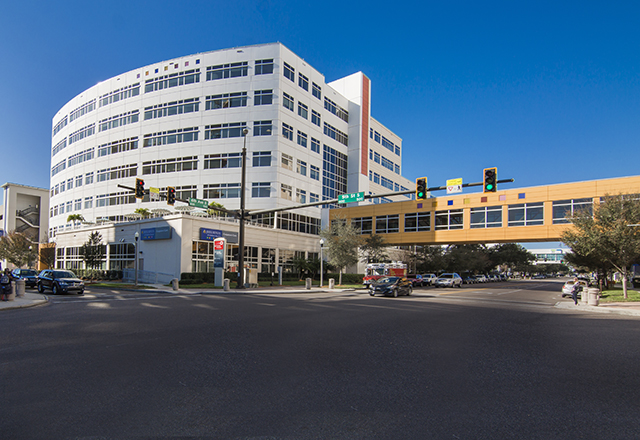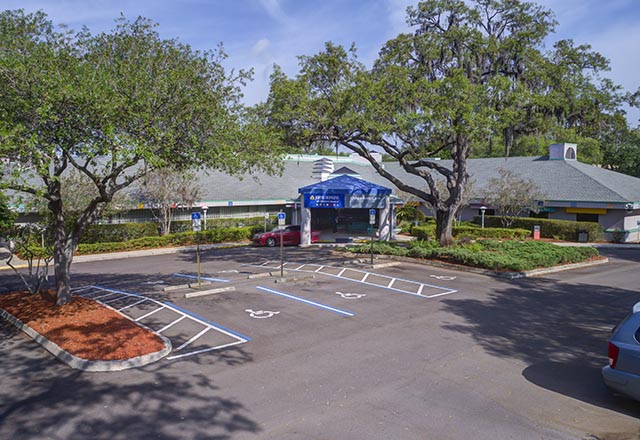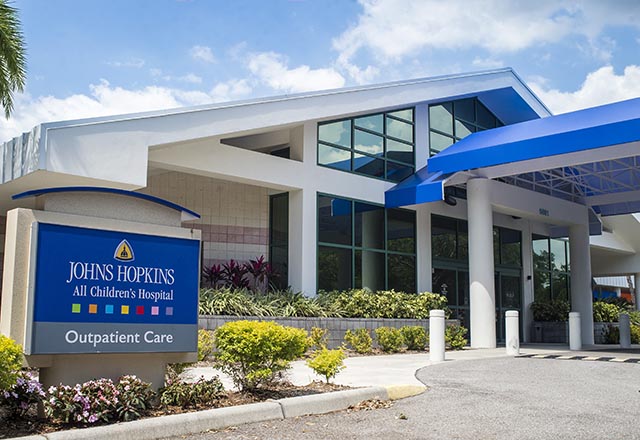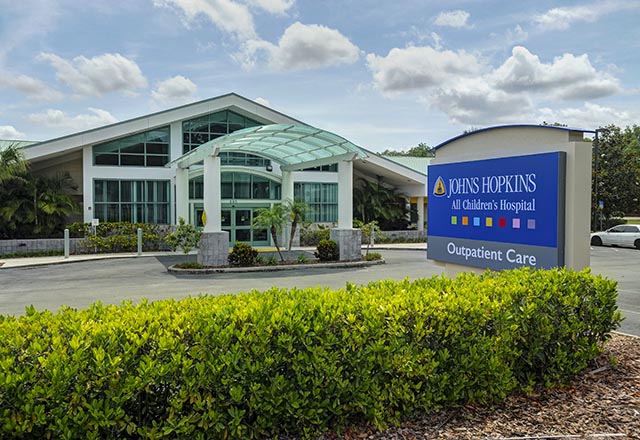Our team helps children who have cleft lip, cleft palate and other craniofacial anomalies.
The cleft and craniofacial team at Johns Hopkins All Children’s Hospital treats patients with congenital and acquired abnormalities of the head and neck. The most common conditions we treat include cleft lip and palate, craniosynostosis, hemifacial microsomia, facial paralysis, and deformities of the ears and jaws.
We also treat less common conditions such as Apert syndrome, Crouzon Syndrome, Treacher Collins Syndrome, and craniofacial clefts. The face is a key component in how we present ourselves to the world, feed ourselves, and communicate with others. Our team of experts work together to create a treatment plan ideally designed for each patient’s unique needs.
Learn More: Conditions We Treat
What are the benefits of a team approach?
Craniofacial conditions affect a child’s physical appearance — and more. Feeding, hearing, speech and vision can be affected. They can also affect dental development, motor skills, neurologic function, and intellectual and social development. Our craniofacial team is a group of specialists who are experts in these areas.
To begin, each member of our team will meet with your family to complete a comprehensive evaluation of your child. We will work with your family and your child’s pediatrician to develop a longer-term treatment plan based on your child’s unique needs. Over time, we will continue to review the plan and coordinate the care your child needs until he or she becomes an adult.
We also provide prenatal consults for expectant mothers and families who have received a cleft lip or palate diagnosis for their unborn baby. Our providers will guide you through the treatment process and explain the care that your child will need for cleft lip and palate once they are born. Learn more about prenatal consults.
Who is part of the team?
Our team approach provides the best possible care for your child, drawing on experts in these fields:
Plastic Surgery and Craniofacial Surgery
Our surgeons work closely with the other specialists to correct the anomalies appearance and function of each patient’s face. The goal is to maximize each child’s appearance and function so they can reach their greatest level of success. The surgeons will meet with you to discuss the surgical procedure, expected outcomes, possible complication and alternatives. The goal is to provide you with the information to make informed decisions about your child’s care.
Audiology (Hearing Services)
Children with cleft and craniofacial anomalies are more likely to have hearing problems and middle ear fluid. Hearing problems may delay a child’s speech and language development and later affect a child’s learning and social development. We will test your child’s hearing at each team evaluation. The results of the hearing evaluation also help the otolaryngologist (ear, nose and throat specialist) and speech pathologist plan your child’s treatment, increasing the chances of good speech and language development.
Nursing
Our nurses coordinate the many specialty services your child will need and help guide your family through this process. They help with education, feeding issues, support information, scheduling appointments and follow-up with the team—they can help you explore financial assistance that may be available through Children’s Medical Services, Medicaid and private insurance and can make referrals to community resources.
Orthodontics
The orthodontist evaluates your child’s teeth and facial growth at every team visit in order to coordinate treatment with the surgeons to ensure the most successful outcomes.
Otolaryngology
The otolaryngologist (ear, nose & throat specialist or ENT) helps identify and treat problems caused by middle ear fluid, hearing loss, sinus and breathing problems. Early detection and treatment of middle ear dysfunction often decrease the chance of long-term hearing loss. Treatment coordinated with other surgery plans can decrease the number of hospital visits.
Parents
Parents are important members of the care team. Learning more about your child’s diagnosis helps you take part in making decisions about treatment options. Other team members will work with you to set acceptable goals. You will play a key role in the success of your child’s treatment plan. It’s very important not to miss medical and therapy appointments. The therapists may show you things you can do at home to help your child make good progress. The love and emotional support you give to your child helps develop self-confidence and interpersonal skills and lets the other team members carry out their part of the treatment.
Pediatric Dentistry
The dentists on the team provide early and ongoing evaluation, education and treatment recommendations. They will check your child’s teeth and facial growth at each team visit. Pediatric dental cleaning should be completed every six months starting when your child turns one.
Psychology and Social Work
The unique needs of your child and your family are an important part of the treatment plan. The team social worker, psychologist or psychotherapist can help you share your feelings about your child’s overall development, success at school, family issues and medical care. Patients who are old enough to take part in these discussions will be included. The social worker can assist with referrals to community programs, support activities and camps.
Speech-Language and Feeding
The speech-language pathologist will determine if your child is developing normal oral-motor, feeding and speech skills and whether understanding and use of language is on track for age. These screenings are done at each team meeting. Depending on the results we may recommend additional evaluations, medical or surgical treatment, and/or speech-language or feeding therapy.
Team Pediatrician
Your child will be evaluated by the team pediatrician to review primary and specialty medical needs as well as developmental progress. Your team pediatrician will work closely with your primary care physician to ensure coordination of care specific to our child’s cleft or craniofacial needs.
Accreditation
The Johns Hopkins All Children's Hospital Cleft and Craniofacial Program has been approved by the Commission on Approval of Teams (CAT) as a Cleft Palate Team (CPT) and Craniofacial Team (CFT). The purpose of the Commission on Approval of Teams is to assure patients and families that the teams to which they are referred meet the Standards for Cleft Palate and Craniofacial Teams as set forth by the American Cleft Palate-Craniofacial Association and Cleft Palate Foundation.
Related Links
Contact Us
Give us a call
Our Locations
-
Outpatient Care Center
Johns Hopkins All Children's Hospital 601 5th Street South, St. Petersburg, FL 33701

-
Johns Hopkins All Children's Outpatient Care
Tampa 12220 Bruce B Downs Blvd., Tampa, FL 33612

-
Johns Hopkins All Children's Outpatient Care
Sarasota 5881 Rand Blvd., Sarasota, FL 34238

-
Johns Hopkins All Children's Outpatient Care
Brandon 885 South Parsons Avenue, Brandon, FL 33511

Read inspiring stories about our patients
-
Cleft Palate: Bree’s Story
Bree was born with a rare form of skeletal dysplasia, as well as hearing loss and a cleft of the soft palate. Her family found the expert care Bree needed at Johns Hopkins All Children’s, and the now 6-year-old is celebrating milestones like her kindergarten graduation.

-
Cleft Lip and Palate: Sapphira’s Story
Surgery and treatment have helped baby Sapphira and her family overcome feeding challenges and other issues from a cleft lip and palate. And Sapphira’s smile, her mother says, is contagious.

-
The Best Life for Logan
In Logan’s first precious months of life, he looked different from other babies. He was diagnosed with a complete bilateral cleft lip and palate. Among the most common birth defects in the United States, cleft lip and palate can affect feeding, hearing, speech and dental development.

-
Harper Smiles with The Help of the Cleft and Craniofacial Team
Melissa was treated for cleft lip at Johns Hopkins All Children’s as a child, returning as an adult when her daughter Harper needed treatment for the same condition. The family has found the care and support they needed with the hospital’s cleft and craniofacial team.


